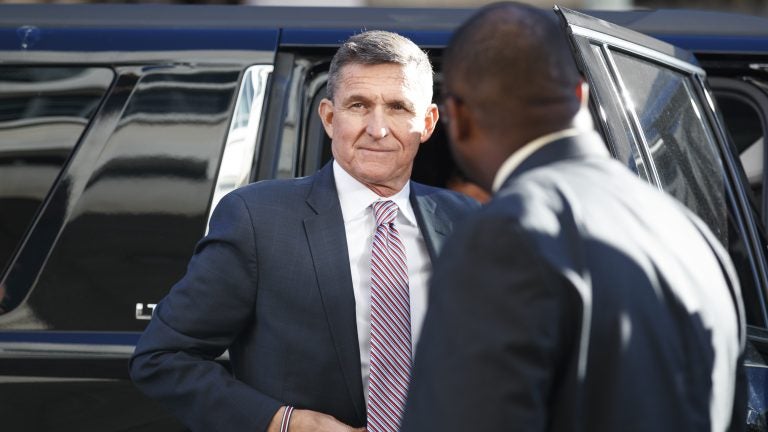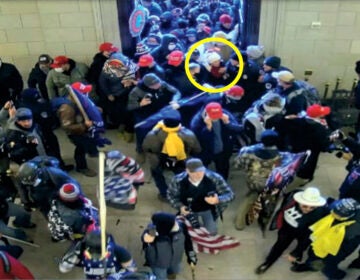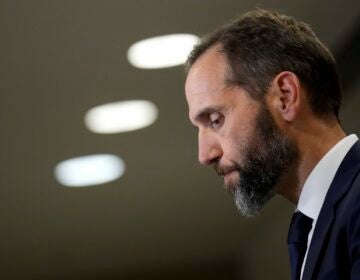Federal judge delays Michael Flynn sentencing in case of lying to Feds

President Trump's former national security adviser Michael Flynn arrives at federal court in Washington. D.C., Tuesday. (Carolyn Kaster/AP Photo)
Updated at 1:19 p.m. ET
A federal judge delayed sentencing national security adviser Michael Flynn on Tuesday after he pleaded guilty to lying to investigators about his talks with Russia’s ambassador.
Flynn spent 2018 giving what prosecutors called all the cooperation they wanted, including in 62 hours of meetings and the production of “sweeping categories” of documents and electronic devices.
In light of that accommodation, the Justice Department had told a judge ahead of Tuesday’s hearing that it would be all right if Flynn received no prison time.
Flynn, in his filing, also asked for leniency.
Ultimately, Judge Emmet Sullivan ordered both sides to file status reports by March 13.
The judge said he has outstanding questions about the case, including how the government’s Russia investigation was impeded and the material impact of Flynn’s lies on the special counsel’s inquiry.
Flynn’s attorney Robert Kelner also said that Flynn may testify in the case prosecutors are making in the Eastern District of Virginia against two of his former business associates. They were charged in documents unsealed on Monday with a scheme to act as unregistered agents for Turkey.
Flynn has been a model cooperator with the Justice Department, his lawyer said, and if he serves as a government witness in the Turkey lobbying case, that may be “the only area where there’s something left to give,” Kelner said.
“General Flynn has held nothing back, nothing, in his cooperation with the special counsel’s office,” Kelner said.
Another surprise twist
The delay in the sentence came as a surprise following the public buildup ahead of the hearing.
In a tweet Tuesday morning prior to the hearing, President Trump had wished Flynn “good luck today.” Trump added, “Will be interesting to see what he has to say, despite tremendous pressure being put on him, about Russian Collusion in our great and, obviously, highly successful political campaign. There was no Collusion!”
Good luck today in court to General Michael Flynn. Will be interesting to see what he has to say, despite tremendous pressure being put on him, about Russian Collusion in our great and, obviously, highly successful political campaign. There was no Collusion!
— Donald J. Trump (@realDonaldTrump) December 18, 2018
Talks with the Russian ambassador and the aftermath
The root of Flynn’s legal troubles stem from conversations he had as part of the Trump administration-in-waiting, a team that had won the 2016 election but not yet assumed office.
As the outgoing Obama administration sought to punish Russia for its attack on the election, Flynn was negotiating with Moscow’s then-ambassador to the United States.
Obama ordered the ejection of a number of Russian diplomats and the closure of facilities they used in New York and Maryland.
In concert with the transition team, Flynn asked then-Ambassador Sergey Kislyak not to escalate any response that Moscow might make to the punitive measures being imposed by Obama.
That may technically have violated a never-enforced law that bars Americans without official power from negotiating with foreign governments or their agents, but it was Flynn and his compatriots’ accounts of the talks that caused the most pressing political trouble.
First, word of Flynn’s conversation made its way into The Washington Post.
Flynn responded by denying that he and Kislyak had talked about the sanctions, including to then-Vice President-elect Pence, who repeated the denial on TV.
Top federal law enforcement officials, however — who knew what had been said from surveillance of Kislyak — feared that Flynn’s public denials put Russia in the position of having something with which it could compromise Flynn.
The rest of the story has lately been filled in by court filings: Flynn phoned then-Deputy FBI Director Andrew McCabe to talk about something else in late January 2017 and then McCabe steered the conversation to Flynn’s contact with the Russians.
“LTG Flynn then explained that he had been trying to ‘build relationships’ with the Russians, and that he had calls in which he ‘exchanged condolences,’ ” McCabe wrote, according to a memo McCabe filed at the time. “He then stated that I probably knew what was said,” after which the sentence is redacted.
Two FBI agents visited Flynn at the White House, according to court documents.
They said they wanted him to be at ease and did not warn him that it was a crime to lie to the FBI; “They were concerned that giving the warnings might adversely affect the rapport,” according to a report about one of the agents.
Criticism of the Flynn interview
The agents’ decision not to remind Flynn that it’s a crime to lie to the FBI has become the subject of criticism, as has the sense that the investigators reportedly got when talking to him that he was not lying.
That has prompted Trump and others to charge that the Flynn case amounts to entrapment.
They gave General Flynn a great deal because they were embarrassed by the way he was treated – the FBI said he didn’t lie and they overrode the FBI. They want to scare everybody into making up stories that are not true by catching them in the smallest of misstatements. Sad!……
— Donald J. Trump (@realDonaldTrump) December 13, 2018
The office of Justice Department special counsel Robert Mueller responded Friday by defending Flynn’s questioning.
Mueller’s office submitted documents in which it laid out the series of events and asserted that if anyone knew to tell the truth to the FBI, it was Flynn — a career intelligence officer who had previously served as the director of the Defense Intelligence Agency.
And Monday night, Mueller’s office filed with the court the FBI reports memorializing Flynn’s interview.
Read Michael Flynn’s sentencing document here.
Criticism of the investigators
One of the FBI agents who took part in the interview was Peter Strzok, then a deputy assistant director in the counterintelligence division.
He has become a political albatross around the neck of the FBI following the discovery of outspoken text messages he exchanged with another FBI employee that criticized Trump as a candidate.
The revelations embarrassed the bureau and Strzok was fired in August. Lisa Page, the FBI attorney with whom Strzok exchanged the incendiary text messages, resigned. McCabe is likewise no longer with the FBI, having been fired in March just short of being eligible to retire, a termination he is fighting in court.
Strzok’s role in the investigation has led to sustained criticism by Trump and his allies that a biased cadre of the conspirators within federal law enforcement are perpetuating the Russia investigation out of political animus.
So where are all the missing Text messages between fired FBI agents Peter S and the lovely Lisa Page, his lover. Just reported that they have been erased and wiped clean. What an outrage as the totally compromised and conflicted Witch Hunt moves ever so slowly forward. Want them!
— Donald J. Trump (@realDonaldTrump) December 16, 2018
Comey defends the FBI’s handling of Flynn
Former FBI Director James Comey was asked Monday about the decisions made at the top level of the bureau at the time of the Flynn interview.
Why, for example, as court documents describe, did Comey not tell then-Acting Attorney General Sally Yates before the Flynn interview that it was happening?

He meant to, but Yates phoned Comey about something else, and it was during that conversation that the director told her about the Flynn situation.
“When he told her the FBI was interviewing Flynn she was not happy,” reads the account released on Friday.
Comey said Monday that he wanted to be clear the FBI was initiating the Flynn interview because it would deny the White House the ability to argue that people like Yates, who were holdovers from the Obama administration, were pursuing Flynn for partisan reasons.
What Comey said he didn’t expect was that Trump and some powerful Republicans in the House would launch a sustained attack on the FBI itself.
“The FBI’s reputation has taken a big hit because the president and his acolytes have lied about it constantly,” he told reporters at the Capitol. “In the face of those lies, a whole lot of good people … believe that nonsense. That’s a tragedy.”
Comey — like McCabe and Strzok — left the FBI involuntarily when he was fired by Trump in May 2017, a move that precipitated the appointment of Mueller as special counsel to take over the FBI investigation of the Russian attack on the 2016 election begun during Comey’s tenure.
9(MDAzMzI1ODY3MDEyMzkzOTE3NjIxNDg3MQ001))




